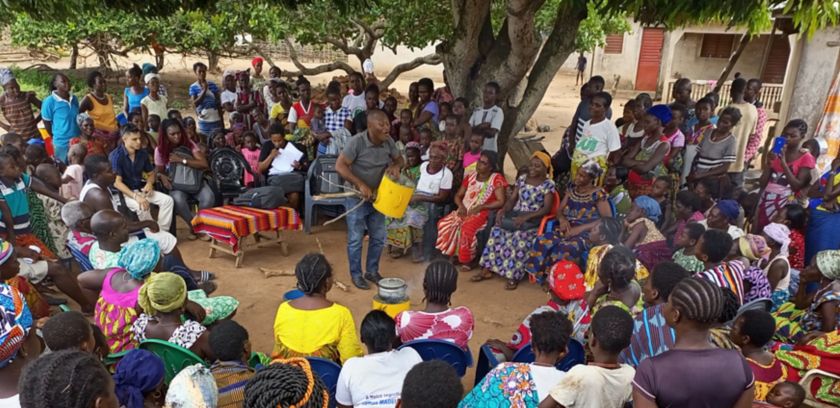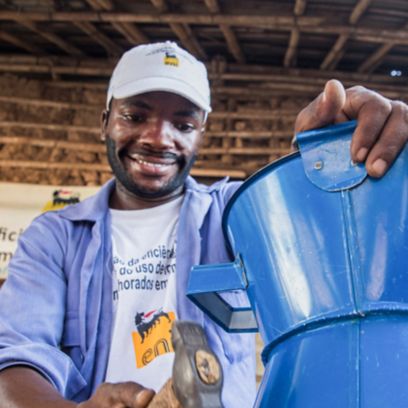Our decarbonization process
Our proactive and tangible actions towards achieving net decarbonization of processes and products by 2050.

Or , our new artificial intelligence tool.
Clean Cooking helps to improve the lives of families in Africa and reduce the use of non-renewable biomass for cooking.

In 2018 we launched our Clean Cooking Programme, which promotes access to higher efficiency cooking systems in sub-Saharan Africa. Compared to traditional methods like the three-stone hearth, these improved stoves ensure reduced wood and charcoal use, significantly cutting the carbon footprint linked to cooking and enhancing the quality-of-life of the families involved. Indeed, using improved stoves offers health benefits, boosts productivity, promotes gender equality, safeguards forests and biodiversity, and cuts GHG emissions.
Clean Cooking is a cornerstone of our pledge to enhance living standards in sub-Saharan Africa. For this reason, we have signed the "Clean Cooking Declaration: Making 2024 the Key Year for Clean Cooking”, an initiative led by the International Energy Agency (IEA), which aims to speed up the global adoption of advanced cooking solutions. This is a vital step in guaranteeing access to affordable, dependable, sustainable and modern energy for everyone, in line with United Nations Sustainable Development Goal 7.
Eni aims to provide 10 million people in sub-Saharan Africa with access to clean cooking systems by 2027. Additionally, we aim to facilitate the shift from improved stoves to advanced systems that can fully eliminate the reliance on unsustainable woody biomass. Following on, we aim to reach 20 million people by 2030.
Clean cooking initiatives not only improve energy access but also help reduce the use of charcoal and firewood, which are key causes of deforestation in many African nations. Additionally, producing and distributing these enhanced stoves locally, in partnership with national and international bodies active in the area, encourages entrepreneurship and bolsters local economies.
The project fully integrates a gender perspective, recognising that women frequently handle meal preparation and spend a significant portion of their day not just on cooking but also on gathering fuel. The improved stoves, compared to traditional methods, nearly halve the use of woody biomass for the same results. In addition to reducing the time women spend gathering fuel and the costs families face when buying it, efficiency also means shorter cooking times, freeing up time for other activities. Lastly, there are additional health benefits, as the new stoves emit less smoke.
Currently, nearly 2.3 billion people rely on traditional biomass for cooking, with 1 billion of them in sub-Saharan Africa1. Our aim is to cut the use of unsustainable fuels widespread across the continent, where meals are often prepared on open fires or basic stoves, subjecting people to dangerous smoke from burning coal, charcoal, and other products linked to unsustainable supply chains.
Eni's Clean Cooking initiatives gained fresh momentum in 2022 with the launch of improved stove distribution in Côte d'Ivoire, benefiting approximately 600,000 individuals.
In Mozambique, we are aiming to reach approximately 1.5 million people on the outskirts of Maputo and in two central provinces. Here, the initiative has engaged local firms to produce stoves, now used by over 100,000 individuals.
In the Republic of the Congo, the Clean Cooking Program was launched in 2023, and aims to enable the entire population of the two main cities (Brazzaville and Pointe Noire) to access the project by 2030. By the end of 2024, Eni had reached more than 200,000 people. The programme also concentrates on supporting local small businesses engaged in stove production, helping them swiftly achieve the required quality and quantity. The goal for the country is to reach at least 3.5 million people.
In 2024, we launched the programme to promote access to more efficient and safer cooking solutions for families in Angola as well. The project, already engaging over 200,000 individuals, aims to reach upwards of 2 million.
In Tanzania, a project was launched in 2024 with the aim of reaching 1 million people, starting from the regions of Tanga, Dodoma and Morogoro.
In Rwanda, the Clean Cooking Program commenced in the Nyagatare district in 2023. The first phase aims to reach 1 million people. Currently, 65,000 people are benefiting from the initiative. A second phase, aiming to reach an extra million people, will launch by the end of 2024. The country aims to reach 2 million people by 2030.
Eni is also developing a Clean Cooking project in Madagascar.
In line with the IEA scenarios and to ensure a fair energy transition, the Eni for Clean Cooking Program supports a gradual shift to “advanced” systems, including distributing induction stoves in cities and pyrolysis stoves in the countryside. These stoves encourage the circular economy by using agricultural waste, such as by-products from Eni's agri-feedstock supply chain.
1) International Energy Agency (IEA) data
will benefit from the Clean Cooking Program by 2027
will benefit from the Clean Cooking Program by 2030
started in Africa for the adoption of advanced stoves

An improved stove produced

Distribution of improved stoves

Distribution of improved stoves

Manufacturing of improved stoves

More widespread use of better cooking systems in the most vulnerable communities can play a major role in tackling deforestation.

We contribute to improving the quality of life of the households involved in the initiative and support local businesses.

Eni launches the Clean Cooking Program in Angola, distributing locally-produced improved cookstoves to families.

A first phase of the project was launched in the district of Nyagatare in December 2024, where more than 66,000 people have already been reached.
Eni’s Clean Cooking Program is part of a broader global context. The Sustainable Development Goal 7 of the United Nations 2030 Agenda (SDG 7) aims to "ensure access to affordable, reliable, sustainable and modern energy systems for all", and within this framework, the International Energy Agency (IEA) highlights the importance of Clean Cooking initiatives. Particularly in African countries, lack of access to clean cooking has direct health, climate and gender implications, contributing to 3.7 million premature deaths of women and children each year in Africa alone. It is estimated that an annual investment of around 4 billion dollars would be needed to ensure access to Clean Cooking for the entire African population by 2030.
In line with these objectives, in May 2024 Eni endorsed the Clean Cooking Declaration: Making 2024 the pivotal year for Clean Cooking during the Summit on Clean Cooking in Africa promoted by the International Energy Agency (IEA). The event, held at the UNESCO headquarters in Paris, brought together heads of state and government, business leaders and representatives of international institutions and civil society from around the world to shed light on the issue. Participants shared insights into the needs and ongoing initiatives in Africa, with the aim of implementing supportive actions and identifying 2024 as a crucial year for accelerating universal access to Clean Cooking.

If you want to change topic, clear the chat and make a new query to receive more relevant results.
This will delete the question history.
If you want to change topic, clear the chat and make a new query to receive more relevant results. This will delete the question history.
Here you can find the full list of your queries.
The answers are generated by artificial intelligence, therefore they may contain inaccuracies. Please read the terms and conditions of use.

EnergIA is an innovative tool based on artificial intelligence capabilities, which can help you navigate the contents of eni.com, quickly finding answers to your questions. EnergIA can also perform a search on a specific topic, providing the most up-to-date data available, or it can invite you to delve deeper into a topic of your interest by suggesting links and specific readings. Start now!
EnergIA is an innovative tool based on artificial intelligence capabilities, which can help you navigate the contents of eni.com, quickly finding answers to your questions. Start now!
EnergIA (ener'dʒia) is a system based on Generative Artificial Intelligence.
Thanks to this technology, we can respond to your requests by querying the most relevant content and documents available on eni.com. (Note: financial documents from the last 12 months and press releases from the last 2 years are considered.)
Through EnergIA, you can delve into topics of interest and have a real-time window into the world of Eni.
If you wish to search for a specific document, press release or news, use the traditional search engine via the magnifying glass icon.
Like all systems that leverage Generative Artificial Intelligence, EnergIA may generate inaccurate or outdated responses. Always consult the sources that EnergIA proposes as the origin of the generated information.
If the system fails to find an exact match for the requested content, it still tends to provide a response.
If you find any inaccuracies in the provided response, please send us your feedback at the bottom of the page: it will be very helpful for us to improve.
Remember that the content generated by the system does not represent Eni’s official position. We therefore invite stakeholders to refer to their designated contacts for official statements: Press Office for journalists, Investor Relations for analysts and investors, Company Secretariat for shareholders etc..
EnergIA can understand questions posed in almost all languages, but we prefer to provide you with a response in English or Italian, the two languages available on eni.com. If you ask a question in Italian, the content on the site in Italian will be consulted. If you ask it in English or any other language, the content in English will be consulted. (Note: the language Eni uses for financial documents/content is predominantly English.)
If questions are formulated that violate the set security criteria, the system will not proceed with processing the response. Please remember not to send personal data.
By using this service, the users acknowledge that they have read and accepted the terms and conditions of use.
Search
EnergIA (ener'dʒia) is a system based on Generative Artificial Intelligence.
Thanks to this technology, we can respond to your requests by querying the most relevant content and documents available on eni.com. (Note: financial documents from the last 12 months and press releases from the last 2 years are considered.)
Through EnergIA, you can delve into topics of interest and have a real-time window into the world of Eni.
If you wish to search for a specific document, press release or news, use the traditional search engine via the magnifying glass icon.
Like all systems that leverage Generative Artificial Intelligence, EnergIA may generate inaccurate or outdated responses. Always consult the sources that EnergIA proposes as the origin of the generated information.
If the system fails to find an exact match for the requested content, it still tends to provide a response.
If you find any inaccuracies in the provided response, please send us your feedback at the bottom of the page: it will be very helpful for us to improve.
Remember that the content generated by the system does not represent Eni’s official position. We therefore invite stakeholders to refer to their designated contacts for official statements: Press Office for journalists, Investor Relations for analysts and investors, Company Secretariat for shareholders etc..
EnergIA can understand questions posed in almost all languages, but we prefer to provide you with a response in English or Italian, the two languages available on eni.com. If you ask a question in Italian, the content on the site in Italian will be consulted. If you ask it in English or any other language, the content in English will be consulted. (Note: the language Eni uses for financial documents/content is predominantly English.)
If questions are formulated that violate the set security criteria, the system will not proceed with processing the response. Please remember not to send personal data.
By using this service, the users acknowledge that they have read and accepted the terms and conditions of use.
A new window into Eni’s world, at your disposal. EnergIA is an innovative tool based on artificial intelligence capabilities, which can help you navigate the contents of eni.com, quickly finding answers to your questions.



